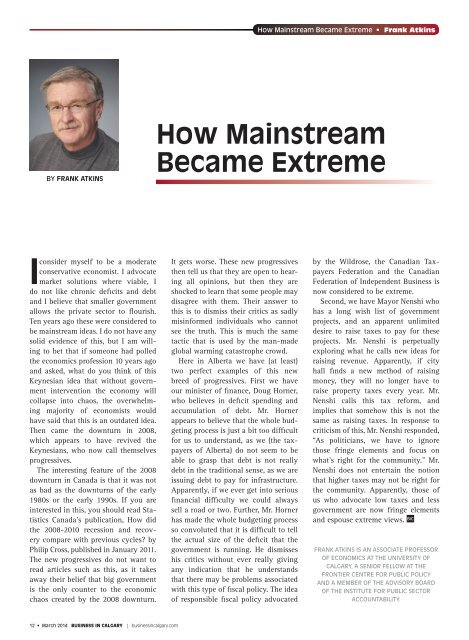Business in Calgary
ears ago I rode France’s excellent fast train, the TGV, from Lyon to Paris. It was an amazing ride – fast, smooth, comfortable and competitively priced. This is a train that actually does 300 kilometres per hour. What is remarkable is that when you go into a curve, you can still walk down the aisle of the train without feeling like you are being thrown against the side. I think this has something to do with the suspension system and track design.It would be my fervent wish that we could duplicate something like that in Alberta. If we did, I would even take a trip to Edmonton just for the ride.But...the current discussion we are having about the costs and benefits of a fast train in Alberta seem more about smoke and mirrors than hard-headed analysis.The TGV is very successful and profitable in France because it serves a population of 60 million people in a country that is 100,000 square kilometres smaller than Alberta, with a population of four million. There are about 12 cities in France with a population between 500,000 and 200,000 in addition to Paris (three million) and Marseille (one million). There are another 20 cities with populations between 100,000 and 200,000.Bless the Van Horne Institute at the University of Calgary for doing its part to keep hammering for an Alberta bullet train. I think the institute should be commended for trying to make us think big and there may be merit in its argument that a high-speed train link between Edmonton and Calgary would open new and creative development synergies in the province.
ears ago I rode France’s excellent fast train, the TGV, from Lyon to Paris. It was an amazing ride – fast, smooth, comfortable and competitively priced. This is a train that actually does 300 kilometres per hour. What is remarkable is that when you go into a curve, you can still walk down the aisle of the train without feeling like you are being thrown against the side. I think this has something to do with the suspension system and track design.It would be my fervent wish that we could duplicate something like that in Alberta. If we did, I would even take a trip to Edmonton just for the ride.But...the current discussion we are having about the costs and benefits of a fast train in Alberta seem more about smoke and mirrors than hard-headed analysis.The TGV is very successful and profitable in France because it serves a population of 60 million people in a country that is 100,000 square kilometres smaller than Alberta, with a population of four million. There are about 12 cities in France with a population between 500,000 and 200,000 in addition to Paris (three million) and Marseille (one million). There are another 20 cities with populations between 100,000 and 200,000.Bless the Van Horne Institute at the University of Calgary for doing its part to keep hammering for an Alberta bullet train. I think the institute should be commended for trying to make us think big and there may be merit in its argument that a high-speed train link between Edmonton and Calgary would open new and creative development synergies in the province.
You also want an ePaper? Increase the reach of your titles
YUMPU automatically turns print PDFs into web optimized ePapers that Google loves.
How Ma<strong>in</strong>stream Became Extreme • Frank Atk<strong>in</strong>s<br />
By Frank atk<strong>in</strong>s<br />
How Ma<strong>in</strong>stream<br />
Became Extreme<br />
I<br />
consider myself to be a moderate<br />
conservative economist. I advocate<br />
market solutions where viable, I<br />
do not like chronic deficits and debt<br />
and I believe that smaller government<br />
allows the private sector to flourish.<br />
Ten years ago these were considered to<br />
be ma<strong>in</strong>stream ideas. I do not have any<br />
solid evidence of this, but I am will<strong>in</strong>g<br />
to bet that if someone had polled<br />
the economics profession 10 years ago<br />
and asked, what do you th<strong>in</strong>k of this<br />
Keynesian idea that without government<br />
<strong>in</strong>tervention the economy will<br />
collapse <strong>in</strong>to chaos, the overwhelm<strong>in</strong>g<br />
majority of economists would<br />
have said that this is an outdated idea.<br />
Then came the downturn <strong>in</strong> 2008,<br />
which appears to have revived the<br />
Keynesians, who now call themselves<br />
progressives.<br />
The <strong>in</strong>terest<strong>in</strong>g feature of the 2008<br />
downturn <strong>in</strong> Canada is that it was not<br />
as bad as the downturns of the early<br />
1980s or the early 1990s. If you are<br />
<strong>in</strong>terested <strong>in</strong> this, you should read Statistics<br />
Canada’s publication, How did<br />
the 2008-2010 recession and recovery<br />
compare with previous cycles? by<br />
Philip Cross, published <strong>in</strong> January 2011.<br />
The new progressives do not want to<br />
read articles such as this, as it takes<br />
away their belief that big government<br />
is the only counter to the economic<br />
chaos created by the 2008 downturn.<br />
It gets worse. These new progressives<br />
then tell us that they are open to hear<strong>in</strong>g<br />
all op<strong>in</strong>ions, but then they are<br />
shocked to learn that some people may<br />
disagree with them. Their answer to<br />
this is to dismiss their critics as sadly<br />
mis<strong>in</strong>formed <strong>in</strong>dividuals who cannot<br />
see the truth. This is much the same<br />
tactic that is used by the man-made<br />
global warm<strong>in</strong>g catastrophe crowd.<br />
Here <strong>in</strong> Alberta we have (at least)<br />
two perfect examples of this new<br />
breed of progressives. First we have<br />
our m<strong>in</strong>ister of f<strong>in</strong>ance, Doug Horner,<br />
who believes <strong>in</strong> deficit spend<strong>in</strong>g and<br />
accumulation of debt. Mr. Horner<br />
appears to believe that the whole budget<strong>in</strong>g<br />
process is just a bit too difficult<br />
for us to understand, as we (the taxpayers<br />
of Alberta) do not seem to be<br />
able to grasp that debt is not really<br />
debt <strong>in</strong> the traditional sense, as we are<br />
issu<strong>in</strong>g debt to pay for <strong>in</strong>frastructure.<br />
Apparently, if we ever get <strong>in</strong>to serious<br />
f<strong>in</strong>ancial difficulty we could always<br />
sell a road or two. Further, Mr. Horner<br />
has made the whole budget<strong>in</strong>g process<br />
so convoluted that it is difficult to tell<br />
the actual size of the deficit that the<br />
government is runn<strong>in</strong>g. He dismisses<br />
his critics without ever really giv<strong>in</strong>g<br />
any <strong>in</strong>dication that he understands<br />
that there may be problems associated<br />
with this type of fiscal policy. The idea<br />
of responsible fiscal policy advocated<br />
by the Wildrose, the Canadian Taxpayers<br />
Federation and the Canadian<br />
Federation of Independent <strong>Bus<strong>in</strong>ess</strong> is<br />
now considered to be extreme.<br />
Second, we have Mayor Nenshi who<br />
has a long wish list of government<br />
projects, and an apparent unlimited<br />
desire to raise taxes to pay for these<br />
projects. Mr. Nenshi is perpetually<br />
explor<strong>in</strong>g what he calls new ideas for<br />
rais<strong>in</strong>g revenue. Apparently, if city<br />
hall f<strong>in</strong>ds a new method of rais<strong>in</strong>g<br />
money, they will no longer have to<br />
raise property taxes every year. Mr.<br />
Nenshi calls this tax reform, and<br />
implies that somehow this is not the<br />
same as rais<strong>in</strong>g taxes. In response to<br />
criticism of this, Mr. Nenshi responded,<br />
“As politicians, we have to ignore<br />
those fr<strong>in</strong>ge elements and focus on<br />
what’s right for the community.” Mr.<br />
Nenshi does not enterta<strong>in</strong> the notion<br />
that higher taxes may not be right for<br />
the community. Apparently, those of<br />
us who advocate low taxes and less<br />
government are now fr<strong>in</strong>ge elements<br />
and espouse extreme views. BiC<br />
Frank atk<strong>in</strong>s is an associatE proFEssor<br />
oF EconoMics at tHE UnivErsity oF<br />
calgary, a sEnior FEllow at tHE<br />
FrontiEr cEntrE For pUBlic policy<br />
and a MEMBEr oF tHE advisory Board<br />
oF tHE <strong>in</strong>stitUtE For pUBlic sEctor<br />
accoUntaBility.<br />
12 • March 2014 BUSINESS IN CALGARY | bus<strong>in</strong>ess<strong>in</strong>calgary.com

















